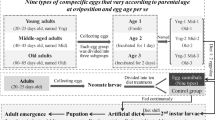Abstract
The adaptive significance of kin cannibalism among beetles has been predominantly reported for carnivorous ladybirds, seldom for herbivorous beetles. Eggs of the red poplar leaf beetle, Chrysomela populi L. (Coleoptera: Chrysomelidae), are deposited in clusters and often eaten by sibling larvae that hatched earlier. In this study, the effects of sibling egg cannibalism on development times, survival from hatching to adult emergence, adult body weight at emergence, and survival of hatchlings under starvation conditions were investigated. Regression analysis revealed that the number of eggs eaten per hatchling in each egg clutch increased adult body weight at emergence and survival under starvation conditions 48 and 60 h after hatching, but had no significant effect on development time, survival from hatching to adult emergence, or survival of hatchlings under starvation conditions 36 h after hatching. These results suggest that the adaptive significance of sibling egg cannibalism for C. populi is heavier body weight of adults and greater starvation tolerance of hatchlings compared with non-cannibal individuals.


Similar content being viewed by others
References
Bartlett J (1987) Filial cannibalism in burying beetles. Behav Ecol Sociobiol 21:179–193
Breden F, Wade MJ (1985) The effect of group size and cannibalism rate on larval growth and survivorship in Plagiodera versicolora. Entomography 3:455–463
Breden F, Wade MJ (1989) Selection within and between kin groups of the imported willow leaf beetle. Am Nat 134:35–50
Dickinson JL (1992) Egg cannibalism by larvae and adults of the milkweed leaf beetle (Labidomera clivicllis, Col. Chrys.). Ecol Entomol 17:209–218
Gomi T, Suzuki J (2003) Reproductive capacity of Chrysomela populi L. (Coleoptera: Chrysomelidae) under a constant temperature and photoperiodic condition. Jap J Appl Entomol Zool Chugoku Branch 45:17–22
Gomi T, Hirose S, Kimura T (2006) Diapause induction and seasonal prevalence of the red popular leaf beetle, Chrysomela populi, in Shobara. Jap J Appl Entomol Zool Chugoku Branch 48:1–6
Gomi T, Kimura T, Hirose S (2008) Seasonal changes in the reproductive and life-history traits of Chrysomella populi L. (Coleoptera: Chrysomelidae). Entomol Sci 11:31–38
Hodek I, Honěk A (1996) Ecology of Coccinelidae. Kluwer, Dordrecht
Honěk A (1993) Intraspecific variation in body size and fecundity in insects: a general relationship. Oikos 66:483–492
Jolivet P, Verma KK (2002) Biology of leaf beetles. Intercept, Hampshire
Kawai A (1978) Sibling cannibalism in the first instar larvae of Harmonia axyridis Pallas (Coleoptera: Chrysomelidae). Kontyu 46:14–19
Kimoto S, Takizawa H (1994) Leaf Beetles (Chrysomelidae) of Japan. Tokai University Press, Tokyo (in Japanese)
Michaud JP, Grant AK (2004) Adaptive significance of sibling egg cannibalism in Coccinellidae: comparative evidence from three species. Ann Entomol Soc Am 97:710–719
Okuda M (1994) The red poplar leaf beetle, Chrysomela populi L. In: Kobayashi F, Taketani A (eds) Forest insects. Yokendo, Tokyo, pp 361−362 (in Japanese)
Omkar Pervez A, Gupta AK (2007) Sibling cannibalism in aphidophagous ladybirds: its impact on sex-dependent development and body weight. J Appl Entomol 131:81–84
Osawa N (1992) Sibling cannibasism in the ladybird beetle Harmonia axyridis: fitness consequences for mother and offspring. Res Popul Ecol 34:45–55
Osawa N (2002) Sex-dependent effects of sibling cannibalism on life history traits of the ladybird beetle Harmonia axyridis (Coleoptera: Coccinellidae). Biol J Linn Soc 76:349–360
Osawa N, Nishida T (1992) Seasonal variation in elytral colour polymorphism in Harmonia axyridis (the ladybird beetle): the role of non-random mating. Heredity 69:297–307
Roy HE, Rudge H, Goldrick L, Hawkins D (2007) Eat or be eaten: prevalence and impact of egg cannibalism on two-spot ladybirds, Adalia bipunctata. Entomol Exp Appl 125:33–38
Stevens L (1992) Cannibalism in beetles. Cannibalism: ecology and evolution among diverse taxa. In: Elgar MA, Crespi BJ (eds) Oxford University Press, New York, pp 361−362
Ueno H, Sato Y, Tsuchida K (1998) Colour-associated mating success in a polymorphic ladybird beetle, Harmonia axyridis. Func Ecol 12:757–761
Author information
Authors and Affiliations
Corresponding author
Rights and permissions
About this article
Cite this article
Gomi, T., Natsuyama, M. & Sasaki, N. Effects of sibling egg cannibalism on the development and survival of Chrysomela populi (Coleoptera: Chrysomelidae). Appl Entomol Zool 50, 451–455 (2015). https://doi.org/10.1007/s13355-015-0352-9
Received:
Accepted:
Published:
Issue Date:
DOI: https://doi.org/10.1007/s13355-015-0352-9




